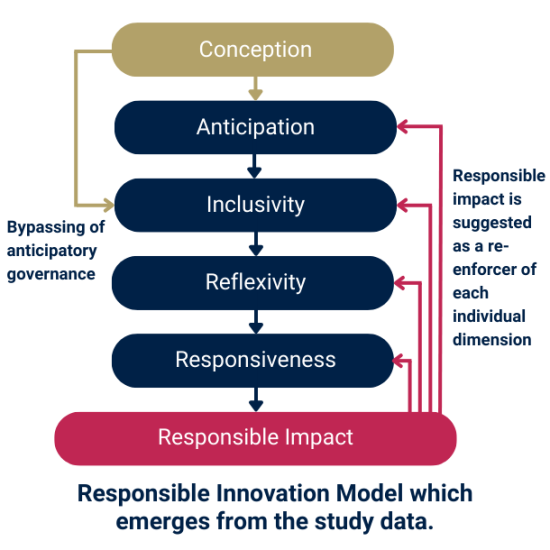by Bernard Naughton, Sue Dopson & Tatiana Iakovleva
From artificial intelligence to machine learning to drones delivering our medicines; everyday advances in healthcare previously could only have existed in the mind of a science-fiction writer.
All of this is happening in a world where people want to know that ethical and sustainability concerns are front and centre of the innovation process.
In tandem, these powerful forces call for a restated commitment, a principled model of work that speaks to our time.
So, how do we best formulate the responsibility of scientists and innovators in digital healthcare to uphold the highest standards?
We’ve identified that at its core, there will be a best practice process that moves through the four known pillars of Responsible Innovation in a particular order.
Most importantly, we’ve identified a fifth component: Responsible Impact. It arises from, underpins and reinforces the entire concept of Responsible Innovation.

What we’ve learned is that firms need to start with the end in mind. When it comes to ethical innovation in digital healthcare, the ‘how’ must always have a ‘why’. And that ‘why’ is best explored through a defined process. This approach is most likely to yield a virtuous circle.
What is responsible innovation?
The concept of businesses having a responsibility to the public good isn’t new. It began with the concept of ‘Corporate Social Responsibility, of which ‘Responsible Innovation’ is a modern evolutionary branch. Most agree it includes these four core principles:
- Anticipatory Governance: Predicting a technology’s potential impact on society.
- Inclusivity: Engaging stakeholders and the public in the process of innovation.
- Reflexivity: Reflecting on one’s assumptions and preconceived notions.
- Responsiveness: Adapting an innovation stakeholder’s concerns and feedback.
Together, these pillars ensure that technological advancements have a positive impact on society and the environment. However, there’s often been a gap in understanding how to translate theory into consistent practice.
Where did we start?
So, we began with two simple questions:
- Do digital health firms engage in responsible innovation, and if so, how?
- How can responsible innovation processes be reinforced?

To answer the above, we focused on the UK and Norway. We chose these two countries because they have roughly equal levels of prosperity and similar healthcare systems.
They also have similar public sector ecosystems, largely state-funded, with policies encouraging digital innovation.
We identified 18 firms in the digital healthcare space, working in partnership with public institutions.
We deliberately chose a wide spectrum, ranging from a seven-year-old start-up with two employees to a business with 1,400 workers that’s been around since the 1940s.
Then we conducted in-depth interviews with the senior leadership to learn more about their innovation process.
What we found
We found that all the firms we studied were practising at least some aspect of Responsible Innovation (RI). However, not all included each of the four components; firms often put a differing focus on specific aspects, and RI was not always practised consistently.
An array of products and services were on offer, from Digital Cognitive Behavioral Therapy, to a tool to monitor falls to healthcare training. Still, as we analysed over 647 pages of interview transcripts, a clear pattern emerged. There was a distinct narrative to the most consistent Responsible Innovation practices of mature firms.
First, there is thoughtful forecasting about an innovation’s potential impact (Anticipatory Governance). However, if a step was more likely to be skipped, it was this one.
Secondly, all stakeholders, including the public were engaged in the development of an innovation (Inclusivity).
Thirdly, those behind the work questioned their own implicit and explicit assumptions (Reflexivity).
Finally, the product was adapted in response to both positive and negative critique (Responsiveness).

Moving through the steps in this order helps to 'grease the wheels' - creating a process, which makes it easier to adopt and stick with the principles of RI.
Responsible Impact

This analysis brought us to our fifth element - Responsible Impact.
In simple terms, it’s a clearly defined and positive effect that a digital healthcare innovation will have on society.
What makes it unique is that Responsible Impact is a unique pillar of the Responsible Innovation process - following naturally from the first four stages we identified, and it is the foundation on which the entire process is built.
At each stage, from Anticipatory Governance to Responsiveness, we would suggest that when an innovator understands why one is innovating, it encourages and supports them to implement all the other pillars; and to follow a process that has the greatest likelihood of delivering their ‘why.’
And when those in a firm can see the positive benefit of their process and their work, both for society and for themselves, we would suggest it strongly reinforces their commitment to practising Responsible Innovation.
Conclusion - What now?
The results of our work are not the end, they’re a place to begin. Our specific focus has given us a firm foothold of understanding. We’ve identified a best practice process for working through the core elements of Responsible Innovation in digital healthcare. And now that we have identified Responsible Impact as a new fifth step - which results from, underpins and reinforces all the other ingredients - we need to investigate further how to make this process work for digital healthcare firms at all stages of the business lifecycle. We don’t know if this model can be replicated in other industries subject to these kinds of debates.
But if we want and need private firms to keep choosing Responsible Innovation practice, it is worthwhile to explain how it benefits them and all of us. Starting with the end - a positive outcome for a scientist, a firm, and society is a force multiplier for an ethical and sustainable future.
Background research
This article is based on the research paper Responsible impact and the reinforcement of responsible innovation in the public sector ecosystem: cases of digital health innovation by
- Bernard Naughton, Assistant Professor, Pharmacy at Trinity College Dublin
- Sue Dopson, Professor of Organisational Behaviour, Saïd Business School
- Tatiana Iakovleva, Professor of Entrepreneurship at Stavanger Business School





